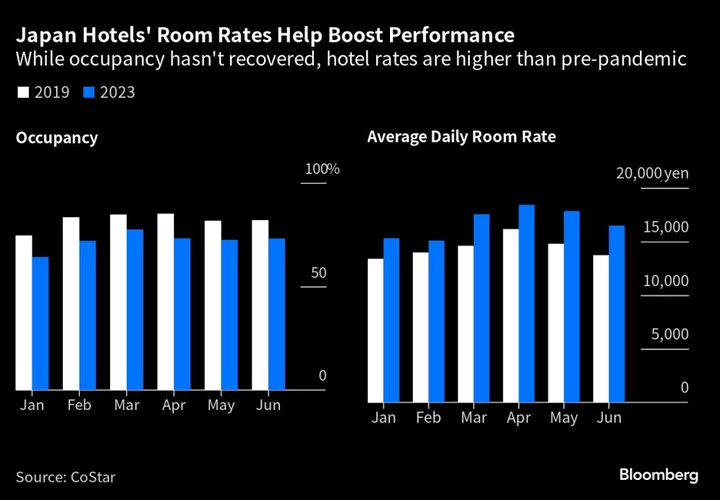A tourism boom in Japan, bolstered by the return of Chinese visitors, and the highest level of inflation in four decades are fueling a boom in hotel investment in the island nation.
Foreign investors have spent $2 billion on hotel deals in Japan so far in 2023, the most compared with any other sector in Asian commercial property, according to MSCI Real Assets. That’s already more than the $1.4 billion seen for all of 2022.
Robust demand for lodging by visitors and rising prices create an ideal scenario for investment. In an inflationary environment, hotels have the ability to change room rates in real time to adjust pricing — making them more attractive than apartments, offices or warehouses where lower rental prices may be locked in for years. On top of that, a weak yen makes Japan more attractive for tourists, and investors, seeking good deals.
“We’re actively looking for new acquisition opportunities,” said Kenny Ho, chief executive officer of Taipei-based private equity fund Envision Investment Management, which focuses on value-add real estate investments in Japan and Taiwan. “As Japan’s tourism market attract increasing international arrivals, the hotel market will be able to grow and diversify to fill different types of lodging demand.”
Compared with before the pandemic, visitors to Japan are spending more. Most of that money is going to lodging and hospitality, according to spending data from the Japan Tourism Agency. After years of deflation, core prices excluding energy and fresh food are increasing at the fastest pace since 1981.
These factors suggest there’s more room for the hotel sector to expand. Both the number of visitors to Japan and hotel occupancies are still below levels seen in 2019, but the average daily room rate in the first half of the year was on average 16% higher than rates charged in the first half of 2019, according to real estate data provider CoStar.
Daisuke Kitta, Blackstone Inc.’s head of Japan real estate, said earlier this month that hotels were at the “top of the list” for acquisition priorities, as the world’s largest alternative asset manager shifts back to looking for purchases after a year of selling more than $4.5 billion in Japan property assets.
Last month, a consortium formed by Goldman Sachs Asset Management, Abu Dhabi Investment Authority, and Singapore’s SC Capital Partners purchased a portfolio of 27 properties for around $900 million. Canadian private equity firm BentallGreenOak agreed to buy the Ritz-Carlton in Fukuoka this summer, and KKR & Co. and Hong Kong-based Gaw Capital announced a deal for the Tokyo Hyatt Regency in the spring.
At the same time, there are persistent challenges in the hotel sector — especially a chronic labor shortage in Japan that is more acute in the hospitality industry and could hinder business and profitability, according to real estate services firm Savills Plc.
For investors seeking to buy properties, the market is tight and competition is fierce. Spending on hotels by overseas investors recorded its fastest pace in nearly a decade, making up the largest proportion of hotel deals in Japan since 2014, according to MSCI.
Zoe Ward, the chief executive officer of brokerage Japan Property Central KK, is working with several Singaporean clients with a budget of up to $100 million who want to buy business hotels in Japan as soon as possible.
“What we’re up against is a really low supply and quite a bit of competition because everybody’s looking for the same kind of hotels in the key tourist areas,” she said.









